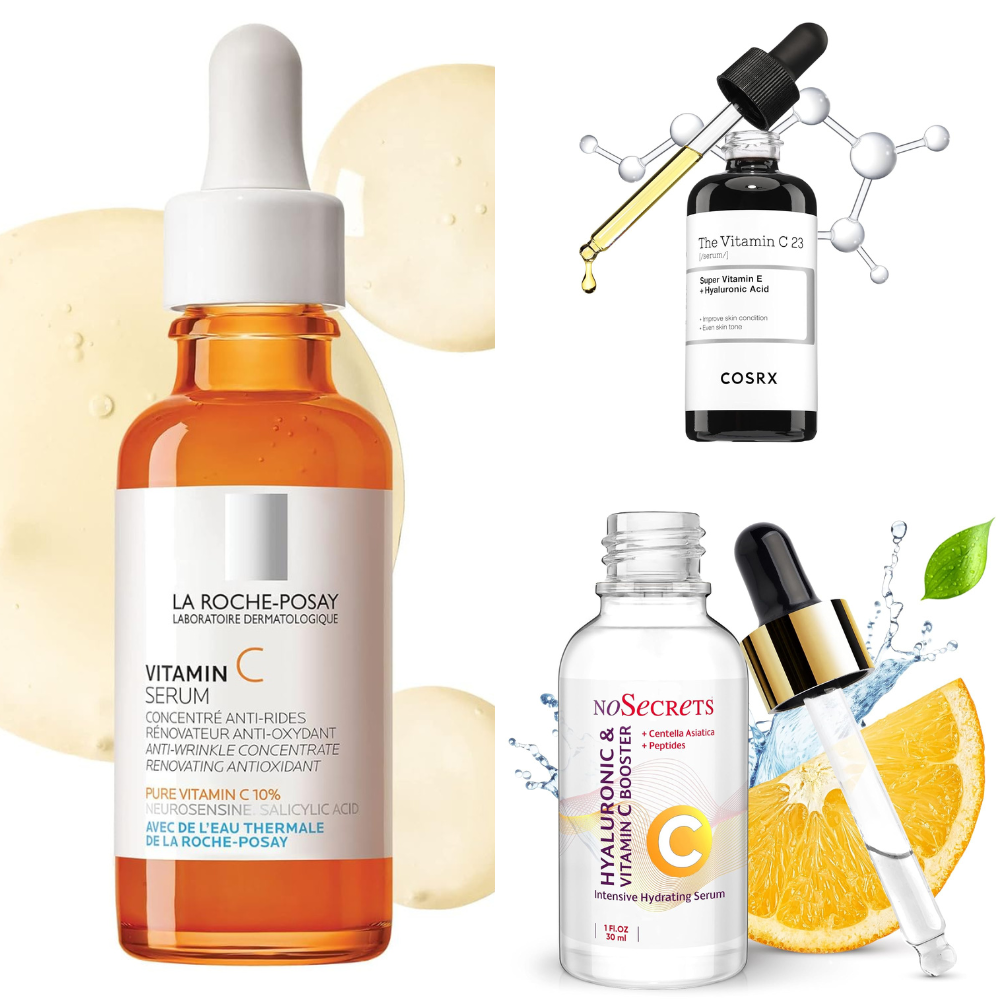Key Takeaways:
- Understand the optimal time to apply vitamin C serum for maximum skin health benefits.
- Learn how vitamin C serum works with other skincare products for a complete skincare routine.
- Discover the differences in serum formulations and how they cater to various skin types.
Vitamin C serum has become a staple in skincare routines worldwide, lauded for its potent antioxidant properties and ability to brighten dull skin, promote collagen production, and fade hyperpigmentation. However, with the plethora of information available, it can be confusing to determine when to use vitamin C serum day or night. This article will delve into the science behind vitamin C serums and provide a comprehensive guide to their optimal use.
The Science Behind Vitamin C Serums
Vitamin C, also known as l ascorbic acid, is a powerful antioxidant that neutralizes free radicals, and unstable molecules that can cause premature signs of aging. Topical vitamin C serums are specially formulated to be easily absorbed by the skin, ensuring that a high concentration of the vitamin reaches the deeper layers of the skin where it can work effectively.
Daytime Use: Protection Against Environmental Stressors
Applying vitamin C serum during the day has its benefits. It can help protect the skin from damage caused by UV rays and pollution. When used in conjunction with a broad-spectrum sunscreen, it adds an extra layer of defense, as vitamin C can neutralize free radicals that penetrate the sunscreen barrier.
Nighttime Use: Enhanced Repair and Regeneration
At night, the skin undergoes a natural repair process. Using a vitamin C serum at night can support this process, as it promotes collagen production and helps repair sun damage. The absence of environmental stressors at night allows the serum to work without competing with other factors like sunlight and pollution.
Vitamin C and Your Skincare Routine
Incorporating vitamin C into your skincare routine requires understanding how it interacts with other products. For instance, vitamin C can be less effective when used with benzoyl peroxide or certain types of AHAs. It's essential to apply vitamin C serum after cleansing and toning but before heavier products like moisturizers or night creams.
Serum Formulations: L Ascorbic Acid vs. Derivatives
Not all vitamin C serums are created equal. L ascorbic acid is the most potent form of vitamin C, but it can be irritating to sensitive skin. Derivatives like magnesium ascorbyl phosphate offer a more stable form of vitamin C that is less likely to cause skin irritation and is better suited for sensitive or acne-prone skin types.
The Role of Ferulic Acid and Vitamin E
Many vitamin C serums also contain ferulic acid and vitamin E, which can enhance the effectiveness of vitamin C. Ferulic acid helps to stabilize the serum and increase its longevity, while vitamin E works synergistically with vitamin C to double up on antioxidant protection.
Addressing Specific Skin Concerns
Whether you're looking to brighten skin tone, smooth skin texture, or reduce the appearance of dark spots, vitamin C serum can be a valuable addition to your skincare regimen. It's important to choose a serum that targets your specific concerns and is suitable for your skin type.
Vitamin C for Different Skin Types

Oily skin, dry skin, and sensitive skin all have unique needs when it comes to skincare products. Find vitamin C serums that are tailored to your skin type for the best results. For example, serums with hyaluronic acid are excellent for dry skin, providing hydration along with the benefits of vitamin C. Customizing Vitamin C Serum for Acne-Prone Skin Incorporating a vitamin C serum into a skincare routine tailored for acne-prone skin can be transformative. The serum's antioxidant properties not only promote healthy skin but also help in reducing inflammation associated with breakouts. When selecting a serum form for acne-prone skin, it's crucial to opt for non-comedogenic options that won't clog pores. A lightweight, water-based face serum is often the best fit, as it delivers the active ingredients without adding excess oil to the skin.
For those struggling with acne, vitamin C serums can do more than just brighten skin; they can also aid in healing and preventing acne scars. By accelerating the skin's natural regeneration process, vitamin C helps fade hyperpigmentation and post-inflammatory discoloration. To maximize benefits, apply toner before the serum to balance the skin's pH, and follow up with a non-greasy night cream to lock in moisture and nutrients while you sleep.
Enhancing Vitamin C Efficacy with Proper Application and Sun Protection To reap the full benefits of vitamin C serum, proper application is key. After cleansing, apply toner to prepare the skin, then dispense a few drops of the serum onto your fingertips and gently press it onto your face and neck. Allow the serum to fully absorb before proceeding with your skincare routine. This ensures that the active ingredients penetrate effectively for optimal bright skin results.
Moreover, pairing your vitamin C serum with broad-spectrum sunscreen during the day is essential for protecting healthy skin from UV-induced damage. While vitamin C provides antioxidant protection, it does not replace sunscreen. A broad-spectrum sunscreen with at least SPF 30 will shield the skin from harmful rays, preventing premature signs of aging and enhancing the anti-aging properties of your serum. Remember, consistency is key in any skincare routine, so make sure to apply these products daily for the best serum fit for your skin's needs.
Combining Vitamin C with Other Antioxidants
Vitamin C works well when combined with other antioxidants. This combination can help to further protect the skin from environmental damage and enhance the overall effectiveness of your skincare products.
The Importance of Sunscreen with Vitamin C
While vitamin C provides some protection against sun damage, it should not replace your daily sunscreen. Always apply a broad-spectrum sunscreen after your vitamin C serum during the day to ensure comprehensive protection.
The Impact of Vitamin C on Skin Health
Regular use of vitamin C serum can lead to healthier, more resilient skin. It helps to combat visible signs of aging, such as wrinkles and fine lines and contributes to a more radiant and even complexion.
How to Apply Vitamin C Serum
For best results, apply a few drops of vitamin C serum to clean, dry skin. If you have sensitive skin, start with a lower concentration and gradually increase as your skin builds tolerance.
When to Expect Results
Improvements in skin health and appearance can take time. Consistent use of vitamin C serum, whether during the day or at night, is key to seeing visible changes in your skin.
Storing Your Vitamin C Serum
Proper storage is crucial to maintain the potency of your vitamin C serum. Keep it in a cool, dark place to prevent oxidation, which can reduce its effectiveness.
Making Vitamin C Serum a Part of Your Beauty Sleep
Incorporating vitamin C serum into your nighttime skincare routine can enhance your beauty sleep, allowing you to wake up to glowing skin that feels refreshed and rejuvenated.
Vitamin C Serum and Anti-Ageing Properties
The anti-aging properties of vitamin C serum are well-documented. Regular application can help to reduce the premature signs of aging and keep your skin looking youthful.
Finding the Right Vitamin C Serum for You
With so many vitamin C products on the market, it's important to find a serum that fits your skin's needs. Look for reputable brands and formulations that have been clinically tested for efficacy.


Can vitamin C serum be used with other skincare products?
Yes, vitamin C serum can be used with other skincare products, but it should be applied after toning and before heavier creams or moisturizers. Be cautious when using it with products containing benzoyl peroxide or certain AHAs, as it may reduce its effectiveness.
How often should I apply vitamin C serum?
Vitamin C serum can be applied once or twice daily, depending on your skin's sensitivity and the specific product's instructions. It's important to start with a lower frequency and concentration if you have sensitive skin and then gradually increase as tolerated.
Should I use vitamin C serum in the morning or at night?
Vitamin C serum can be used both in the morning and at night. In the morning, it provides extra protection against environmental stressors, while at night, it aids in the skin's natural repair process. Some people prefer to use it during the day, while others opt for nighttime applications. It ultimately depends on your personal preference and skincare routine.

Vitamin C serum is a versatile skincare product that can be used both day and night to improve skin health. During the day, it offers additional protection against environmental damage, while at night, it supports the skin's natural repair process. Choosing the right formulation and combining it with other skincare products can maximize its benefits. Regular use can lead to brighter, smoother, and more youthful-looking skin.













